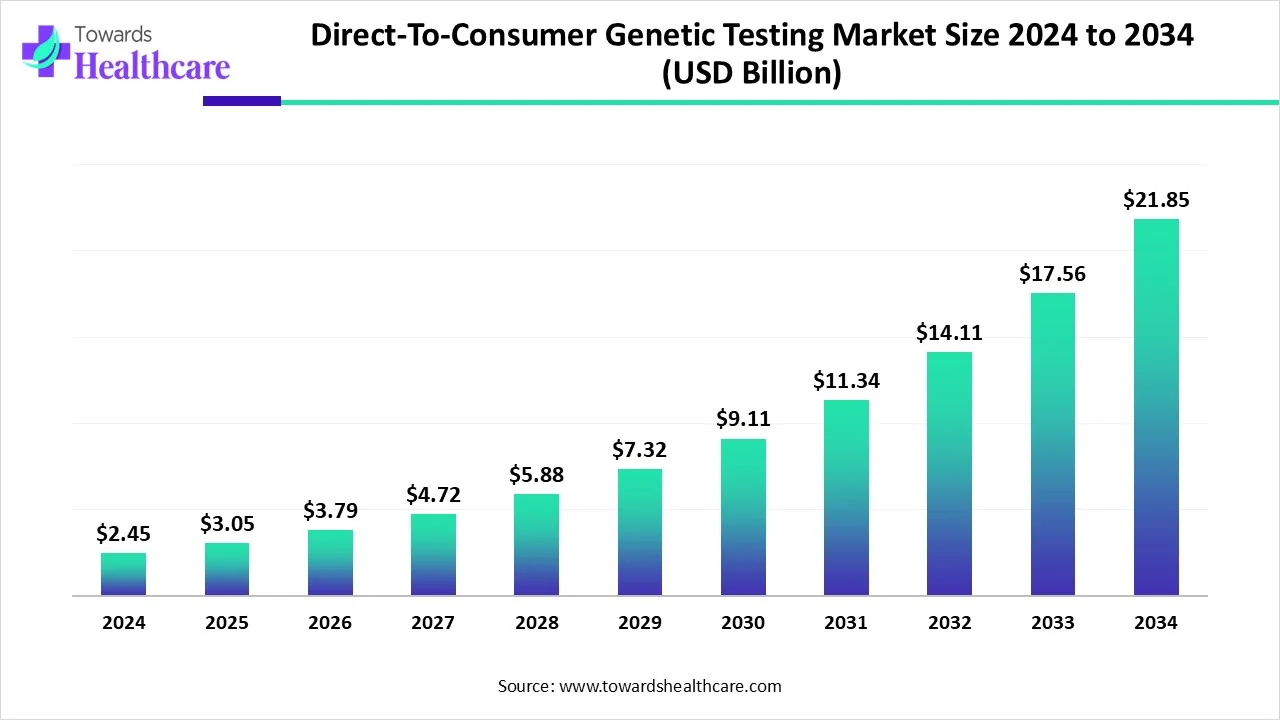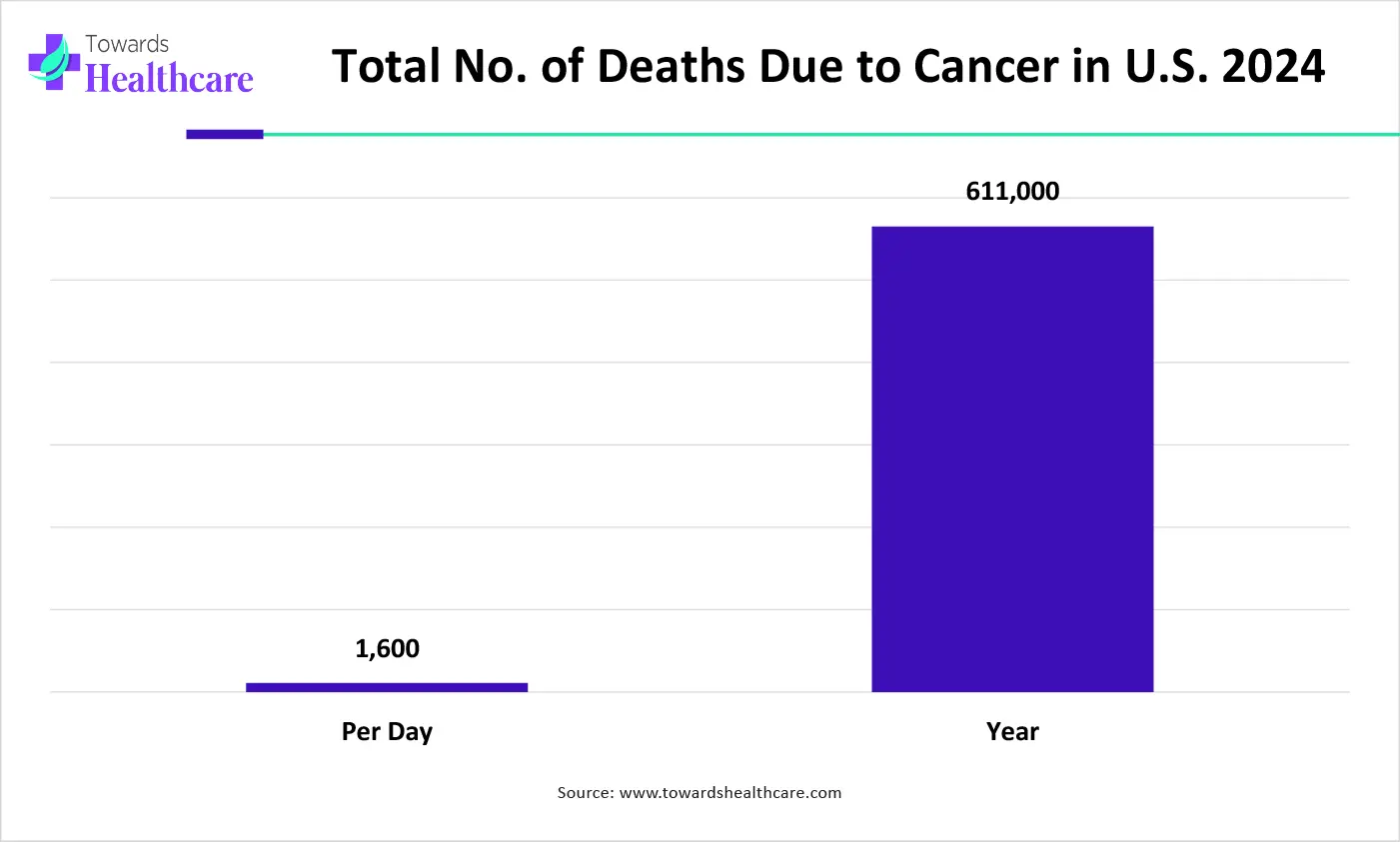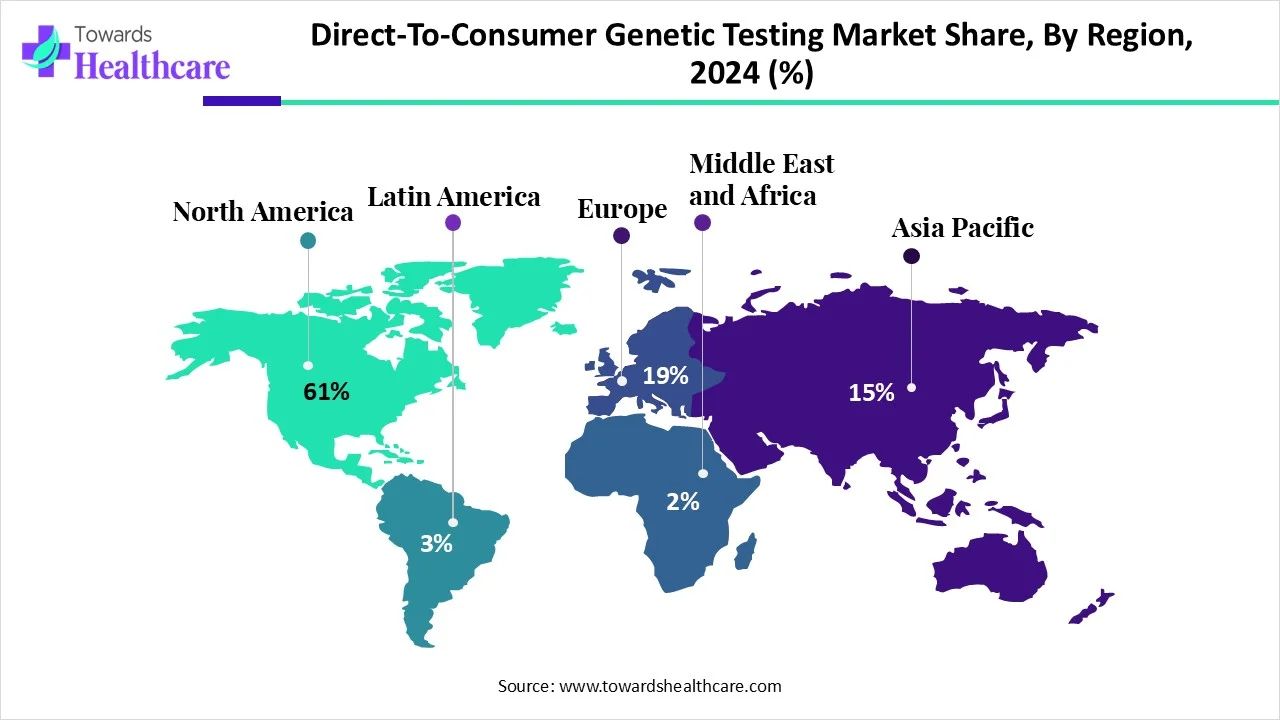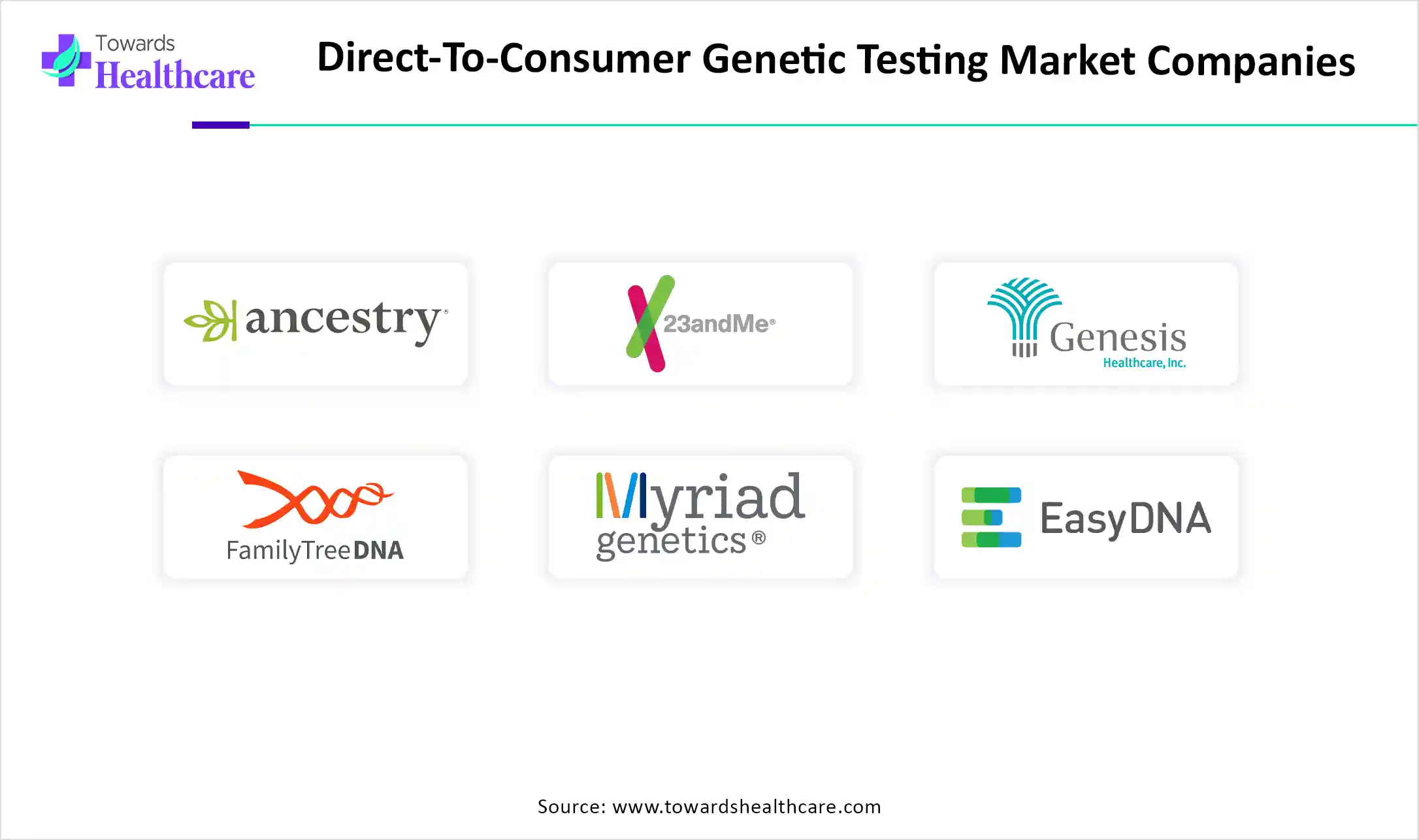January 2026

The global direct-to-consumer genetic testing market size is calculated at USD 2.45 billion in 2024, grew to USD 3.05 billion in 2025, and is projected to reach around USD 21.85 billion by 2034. The market is expanding at a CAGR of 24.44% between 2025 and 2034.

| Metric | Details |
| Market Size in 2025 | USD 3.05 billion |
| Projected Market Size in 2034 | USD 21.85 billion |
| CAGR (2025 - 2034) | 24.44% |
| Leading Region | North America share by 61% |
| Market Segmentation | By Test Type, By Technology, By Distributional Channel, By Region |
| Top Key Players | Ancestry, 23andMe, Genesis HealthCare, Family Tree DNA, Myriad Genetics Inc., EasyDNA,, Living DNA Ltd., Veritas, Color Health, Inc., Full Genomes Corporation, Inc. |
Direct-to-consumer genetic testing (DTC-GT) provides as well as advertises genetic testing by companies without the help of conventional healthcare systems directly to consumers. Here, the biological samples, such as blood samples, saliva, or cells from a cheek swab, that contain DNA are collected by the consumers and sent to the DTC-GT company. The DTC-GT company then conducts various tests for identifying genetically related information, pharmacogenomics, genetic health risks, and cancer risks. Depending upon the regulations surrounding DTC-GT, consumers can apply to DTC-GT outside of their country. Furthermore, it also helps in screening single-gene and multifactorial gene disorders.

The graph represents the total number of deaths due to cancer observed in the U.S. in year of 2024. It indicates that there is a rise in cases of cancer. Hence, it increases the demand for DTC genetic testing for early diagnosis as well as for the effective management of cancer. Thus, this in turn will ultimately promote the market growth.
AI helps in the analysis of complex genetic data as well as in its interpretation. Moreover, it can also be used to identify drug responses as well as genetic variants, depending on the genetic information of the patient. Hence, all these factors, with the use of AI, help in improving the DTC genetic testing. Furthermore, it also helps in identifying the risk associated with the patients and provides them with personalized treatment plans for the disease and its complications. Additionally, with the use of genetic data, AI can also be used in the drug development process.
Rising Awareness
There is a rise in awareness within the population due to increasing campaigns and programs. This, in turn, raises the importance of early diagnosis as well as healthcare. Furthermore, the rising genetic disorder also contributes to the same. Thus, for proper and effective management of various genetic disorders, genetic screening is increasing. Hence, all these factors increase the demand for the use as well as adoption of direct-to-consumer genetic testing platforms. This enhances the genetic testing as well as patient satisfaction. Thus, this enhances the direct-to-consumer genetic testing market growth.
Privacy Concerns
A large amount of genetic data is collected and stored in the direct-to-consumer genetic testing facilities. This increases the risk of data breaches as well as hacking. This, in turn, can cause the data of an individual to be exposed, which leads to patient dissatisfaction. Thus, the privacy concern results in decreased use of DTC genetic testing.
Increasing Personalized Treatment Approaches
Due to rising genetic disorders, there is a rise in the use of various personalized treatment approaches. Therefore, by using the information gathered from the genetic profile of the patient, new personalized treatment plans are being developed. This, in turn, increases the demand for DTC genetic testing facilities as well as genomic medicines. Personalized treatment approaches also reduce the side effects due to targeted treatments. Thus, all these factors enhance the use of DTC genetic testing as well as promote the direct-to-consumer genetic testing market growth.
For instance,
By test type, the predictive testing segment dominated the market in 2024. This segment dominated because the predictive testing helped in providing health insights, as well as the risk associated with it. This contributed to the direct-to-consumer genetic testing market growth.
By test type, the nutrigenomics testing segment is estimated to grow significantly at a notable CAGR during the forecast period. The use of nutrigenomics testing is growing as it uses genetic information for maintaining a diet for better health or weight loss plans.
By technology type, the whole genome sequencing segment dominated the market in 2024. The segmental growth is attributed to advances in genetic engineering and the integration of AI and ML in DNA sequencing techniques. Whole-genome sequencing was used in various health conditions. Furthermore, it was affordable, which enhanced the market growth.
By technology type, the targeted analysis segment is anticipated to grow significantly during the forecast period. The results obtained by targeted analysis are often rapid as well as are less complex for interpretation, which in turn, increases their use.
By distribution channel type, the online platform segment dominated the global direct-to-consumer genetic testing market in 2024. The segment dominated because the online platform offered convenience as well as a wider range of DTC genetic testing services, which promoted the market growth.
By distribution channel type, the OTC platform segment is predicted to grow significantly during the forecast period. The OTC platforms are providing easy access, which in turn is enhancing the consumers' satisfaction.

North America dominated the direct-to-consumer genetic testing market share by 61% in 2024. North America consists of a well-developed healthcare sector, along with the presence of advanced technologies as well as skilled personnel. This increased the use of DTC genetic testing and contributed to the market growth.
The DTC genetic testing companies are increasing in the U.S. At the same time, they are adopting various new technologies for improving their services as well as performance. This is also supported by the government.
The healthcare sector in Canada is well developed, due to which the use of DTC genetic testing is increasing. Moreover, the rising awareness is also increasing the number of tests conducted within the companies.
Europe is estimated to host the fastest-growing direct-to-consumer genetic testing market during the forecast period. Europe is experiencing a rise in awareness about the early diagnosis of genetic diseases or any other diseases. This enhances the market growth.
The increasing awareness, as well as the rising genetic diseases, is driving the demand for genetic testing. This, in turn, increases the use of DTC genetic testing for early diagnosis as well as effective treatment plans.
The use of DTC genetic testing is increasing in the UK due to the growing awareness about the disease, as well as for proper management of health. At the same time, the technological advancements used in DTC are also enhancing the genetic testing conducted.
Asia Pacific is expected to grow significantly in the direct-to-consumer genetic testing market during the forecast period. The healthcare sector in Asia Pacific is advancing with the adoption of various technologies, as well as new diagnostic and treatment approaches. This, in turn, increases the adoption of DTC genetic testing as well. This promotes the market growth.
The healthcare sector in China is utilizing various new advanced technologies for enhancing genetic screening as well as treatment approaches. This, in turn, causes a rise in the use as well as adoption of DTC genetic testing companies.
The healthcare sector in India is developing, which increases the demand as well as the use of DTC genetic testing companies. Moreover, the rising genetic diseases also increase their use. At the same time, to make them affordable government is providing its support.
Latin America is expected to grow at a notable CAGR in the direct-to-consumer genetic testing market in the foreseeable future. The rising prevalence of genetic disorders, growing genomics research, and favorable government policies are the major growth factors of the market in Latin America. Government bodies launch initiatives to create awareness among the general public for screening and early diagnosis of genetic disorders. The number of clinical laboratories in Latin America is increasing with the adoption of massive parallel sequencing. The increasing awareness of personalized medicines also propels market growth.
The Mexican Rare Disease Patient Registry is an open, online, self-reporting registry study to gather information about the rare disease prevalence in Mexico. It was reported that around 71.53% of registered patients were informed that their condition could have a genetic origin. Out of these, 27.77% of patients had a genetic test performed. (Source: Science Direct)
Congenital anomalies are the second leading cause of death among infants in Argentina. It is estimated that approximately 1.7% of babies born are affected by congenital anomalies. According to the International Trade Administration, there are around 6,500 clinical laboratories in Argentina, of which 1,000 are public and 5,500 are private. (Source: Trade Administration)
Latin America is expected to grow significantly in the direct-to-consumer genetic testing market during the forecast period. Latin America is experiencing a rise in advancements in the direct-to-consumer genetic testing platforms. This is increasing the utilization of sequencing and genomics technologies for the development of accurate and affordable genetic testing tools. At the same time, predictive testing approaches are also being developed.
Furthermore, the increasing demand and development of personalized medicines are also increasing their use. This, in turn, is also increasing their purchase through various online distribution platforms. These developments are further being supported by the government investments. Thus, this is enhancing the market growth.
The Middle East and Africa are expected to show lucrative growth in the direct-to-consumer genetic testing market during the predicted time. The awareness about the genetic disorder among the populations of the Middle East and Africa is increasing. This, in turn, is increasing the demand for direct-to-consumer genetic testing options for early detection.
At the same time, the growing research development is increasing its use. This, in turn, is leading to new collaborations among the industries as well as institutes. Moreover, the increasing adoption of advanced technologies is increasing their development and production. Thus, all these developments are promoting the market growth.

By Test Type
By Technology
By Distributional Channel
By Region
January 2026
January 2026
December 2025
October 2025